Programming dreams with fxhash


Splits spoke to Florian Pautot, who leads smart contract development and blockchain architecture at fxhash. It's been an eventful year for the generative art platform, which added support for Ethereum last winter and recently expanded to include Base as well.
Now fxhash is taking a beat to revamp its existing infrastructure, looking to "improve efficiency and velocity" going forward. Florian explained that some of fxhash's technology still dates from the early days when founder ciphrd (Baptiste Crespy) was writing everything by himself.
The first iteration of an ambitious project like fxhash succeeds by getting you where you need to go, above all else — then once you've arrived, you're sort of amazed that the wheels didn't pop off along the way. "fxhash involves many moving parts, it's very complex machinery," Florian told us, so the team is focused on rationalization and simplification. We're impressed that fxhash is actually addressing tech debt, instead of the traditional solution (hoping it will magically disappear).
Meanwhile, fxhash still has an eye to the future. Multichain engineering is exciting and fast-paced, with new tools constantly emerging and the paradigm of the moment constantly in flux. "We are at the edge of everything and we are exploring anything we want," Florian said, which is paradise for lovers of technology, art, and the combination thereof.
Split a song of sixpence
When fxhash decided to debut Ethereum, Splits came in handy. fxhash uses Splits in two ways, depending on whether the NFT sale is primary or secondary. On primary, revenue is divided between the artist (90% cut) and fxhash (10% cut). On secondary, fxhash takes a 25% cut of royalties.
Splits makes it easy for the fxhash team to route payments to the right recipients in the correct proportions. According to Florian, the Splits app has also served its purpose. Names and tags "drastically help us to know where we stand in review," and the API makes it practical to rely on those features at scale.
Visions in code
fxhash facilitates the distribution of generative art. Creative coders define a possibility space, and then snapshots from that space are minted as NFTs. We curated a selection of artworks currently available to mint on fxhash, for your viewing (and perhaps purchasing) pleasure.
Vertical Projection by unsleeping_ik brings to mind an abandoned alien settlement:
0x0cb27e883E207905AD2A94F9B6eF0C7A99223C37.A strange kind of physical reality by Amy Goodchild gestures at "particles spreading out as waves and then collapsing into particles again at a moment of interaction." Goodman ponders:
At the quantum scale, classical ideas of space and form come apart, replaced by concepts, probability and mathematics. Yet I cannot help but imagine tiny structures. There are moments when it feels like, if I concentrated closely enough or reached out in just the right way, I could perceive my hand floating through the particle soup.
0xC13CF604aC4c6C00fc251c8b0345BbD2665bd7cd.ETHygrogen by Obsukiy likewise investigates physics; the series "invites you to immerse yourself in the ethereal beauty of Hydrogen's Quantum Probability Density Functions." The artist writes, "May these artworks inspire you to ponder the delicate dance of electrons and the harmonious chaos that underlies the fabric of reality."
Variation owned by 0x6d81F93D99a51D57573bA355C4890dde5424F424; variation owned by 0x1eC945af051F5eDc01319d9047605197B456943f.
Catho by Infinity evokes yesteryear through pattern: "As the colors shift through bounds, they inadvertently create an effect reminiscent of the classic CRT TV display. This parallel adds a layer of nostalgia to the project, offering a contemporary twist on the familiar, pixel-like patterns of old screens."
RuralRhythms by SaraSmith offers candy-colored townscapes from a video-game phantasmagoria:
0xa5E5d3afE7daF372972559C7Fa3b75cb7A4AE0d7.g-scapes by joey zaza roams through a landscape of Impressionism on acid, with an accompanying soundtrack:


Teardrop by aotearoan is a neo-Bauhaus exploration of shape, contrast, and repetition: